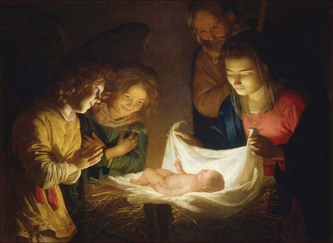
We don’t know when Jesus was born. It was Pope Julius 1, in the 4th century CE, who ordained that 25th December was to be the date when Christians celebrated the birth of Jesus. The date was possibly chosen because it was around the winter solstice and the feast of Saturnalia when pagans were celebrating the return of the “unconquered sun”. Gift giving, festivities and greenery were associated with the feast. What the Pope did was Christianise it, giving it added meaning by showing that Jesus was the Son of God and the true light of the world. Pagan converts could enjoy the festival, keep some of its traditions while understanding it in a new way. Christianity didn’t forbid these celebrations but gave them a deeper meaning and significance by associating them with the birth of Jesus.
It’s not unusual for a religion to somehow incorporate the beliefs of another into its own system. For example Hinduism incorporated the Buddha into its belief system by seeing the Buddha as the ninth incarnation of the God Vishnu. This is especially true when the beliefs are associated with indigenous nature religions, rather than well – established systems of belief. All religions have their places of pilgrimage, holy mountains, holy wells, which often pre-date the founding of the religion. Religions have traditionally built on pagan foundations but this doesn’t in any way invalidate their particular perspective or belief.
Celebrating the birth of its founder is also common in religion. Often there is an element of the miraculous about their conception and birth. The point of these stories is not to tell us what actually happened to show the significance of the founder as one with a special message and gift for the world. Sometimes their birth and death are celebrated on the same day. Wesak, for example, celebrates the birth, death and enlightenment of the Buddha, giving a symbolic completeness to his life. While the nativity stories of Jesus’ birth, as described in the Christian scriptures, focus on Jesus as a baby there are indications that this child will be a controversial figure and a suggestion of what is to come. The story of the slaying of the innocents by Herod may be a reflection on the slaying of the first born by the Egyptians at the time of the Exodus, but it foreshadows the rejection of Jesus which culminated in his death. Similarly the gifts that the three wise men bring include myrrh, embalming oil which is symbolic of death.
These stories are found in the gospel of Matthew. Matthew is not writing a historical or factual account of the events surrounding the birth of Jesus but is in fact writing theology. He is reminding us of the completeness of Jesus life by prefiguring his end. As TS Elliot said” in my beginning is my end" Those of us who have experienced the death of someone whose birth we remember know that our recollection of the birth and life of that person takes on a special significance in the light of their death.
The gospel accounts of the birth and life of Jesus are written in the light of his death and resurrection so they are stories which convey a meaning. Like all religious scriptures it’s not what they say that counts but what they mean. To read sacred texts we need to look beyond the words to discern the truth they contain - truths about God, about ourselves, about human relationships. For Christians the stories of the birth of Jesus are not about a cuddly baby but about the belief that in Jesus God, the source of Life and Love, entered the human condition, that this God is present in the midst of life and that to struggle to live well is to touch God. For as it says in the letter of John, God is love and whoever abides in love abides in God.
For Christians the birth of Jesus lets them see life in a new light and this includes the secular, for the secular is not in opposition to the sacred but is a vehicle for it. Thousands of people will celebrate this winter festival with no nod to religion but they will enjoy their families and lovingly give gifts to one another. In this sense they are in touch with what Christians would see is the true meaning of Christmas.


 RSS Feed
RSS Feed
